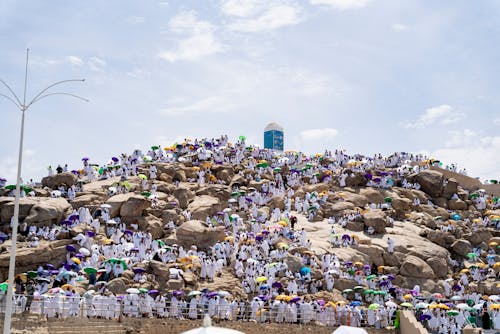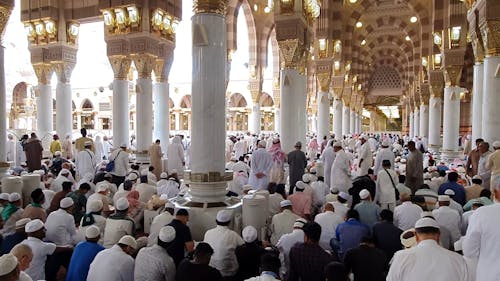The Islamic month of Dhul Hijjah holds a special place in the hearts of Muslims worldwide. It is the twelfth and final month of the lunar calendar, marked by profound spiritual significance. The last 10 days of Dhul Hijjah are particularly important, as they include some of the most sacred days in Islam. Among these, Arafat Day and Eid al-Adha stand out as moments of deep devotion, reflection, and celebration.
In the UAE, these days are not only religious milestones but also times when communities come together, both spiritually and socially. Residents prepare through fasting, prayer, and acts of kindness, setting the tone for the festive days ahead.
What is Arafat Day?
Arafat Day, observed on the 9th day of Dhul Hijjah, is one of the most significant days in the Islamic calendar. It is the day when pilgrims performing Hajj gather at the plain of Mount Arafat to stand in prayer and seek forgiveness. This gathering is the heart of the pilgrimage, symbolising unity, repentance, and hope.
The day also holds special historical importance because it was on Mount Arafat that the Prophet Muhammad (PBUH) delivered his final sermon. This sermon laid down timeless guidance for humanity, emphasising justice, equality, and compassion.
For Muslims who are not on pilgrimage, fasting on Arafat Day is highly recommended. It is a day of immense spiritual reward, believed to cleanse sins from the previous and coming years. The act of fasting and devotion on this day prepares hearts for the joyous celebration that follows.

Source: Pexels
What is Eid al-Adha?
Eid al-Adha, or the “Festival of Sacrifice,” commemorates the remarkable faith of Prophet Ibrahim (AS). According to Islamic tradition, Ibrahim was ready to sacrifice his son in obedience to God’s command. However, God provided a ram as a substitute at the last moment. This story teaches Muslims about devotion, trust, and willingness to sacrifice for the greater good.
Eid al-Adha falls on the 10th day of Dhul Hijjah, immediately after Arafat Day. It is celebrated with special prayers, the ritual sacrifice of an animal (Qurbani), and generous acts of charity. The meat from the sacrifice is shared among family, friends, and those in need, reinforcing the values of sharing and community care.
Unlike Eid al-Fitr, which marks the end of Ramadan, Eid al-Adha is linked closely to Hajj and the spirit of sacrifice. It blends solemn remembrance with joyous celebration, making it one of the two most important Eids in Islam.

Source: Shutterstock
How are Arafat Day and Eid al-Adha connected?
The connection between Arafat Day and Eid al-Adha is both spiritual and chronological. Arafat Day falls on the 9th of Dhul Hijjah and is considered the culmination of the Hajj pilgrimage. It is a day dedicated to repentance, reflection, and seeking forgiveness. The standing at Arafat symbolises a fresh start and spiritual cleansing.
Eid al-Adha follows the very next day, marking the successful completion of Hajj rites and the celebration of Prophet Ibrahim’s devotion. For those fasting on Arafat Day, the act serves as a spiritual preparation for the joy and generosity of Eid.
Together, these days represent a powerful sequence, from devotion and humility on Arafat Day to gratitude and communal joy on Eid al-Adha. They remind Muslims of the importance of faith, sacrifice, and support for others.

Source: Freepik
Arafat Day and Eid al-Adha in the UAE
In the UAE, both Arafat Day and Eid al-Adha are officially recognised as public holidays, announced each year by government authorities. This allows residents and citizens alike to observe these important days with family, prayer, and community gatherings.
On Arafat Day, many UAE residents fast and spend time in mosques or at home reflecting on their faith. It is a quieter day of devotion before the upcoming celebrations.
When Eid al-Adha arrives, the atmosphere shifts to one of joy and festivity. Early morning prayers are held in mosques and open grounds across Dubai, Abu Dhabi, and other emirates. Families visit relatives, exchange Eid al-Adha gifts, and come together for traditional meals.
Charity is a big part of the UAE’s Eid al-Adha customs. Many residents and organisations actively participate in initiatives to help the underprivileged, ensuring the spirit of giving reaches every corner of society.

Source: Pexels
Modern Observances: Blending Faith and Celebration in UAE
Mosques across the emirates organise special Eid prayers to accommodate large congregations, with arrangements becoming more community-friendly each year.
Family gatherings remain central, featuring festive meals rich with traditional dishes. Gifting also plays a warm role in the celebrations, especially among children and neighbours.
For those looking for the perfect Eid al-Adha gifts, we offer a range of thoughtful options. From elegant flower bouquets to personalised gift baskets filled with dates, sweets, and chocolates, these presents convey heartfelt wishes. Popular gifts also include home decor items, premium chocolates, and specially curated hampers that reflect the festive spirit.
Local businesses embrace the season too, offering special sales, decorative items, and ready-made gift baskets that make it easy to share joy and blessings during Eid.

Source: FNP.ae
Reflection and Takeaway
The journey from Arafat Day to Eid al-Adha is a profound spiritual path, one that invites Muslims to renew their faith, embrace humility, and celebrate sacrifice. In the UAE, this journey is honoured not only through worship but also through a strong sense of community and cultural unity.
By observing these sacred days, UAE residents continue to preserve and pass on rich religious traditions while embracing the modern, diverse fabric of their society.
As we exchange Eid al-Adha gifts and share moments with loved ones, it is important to reflect on the deeper meanings, sacrifice, gratitude, and caring for those in need that truly define this blessed time.






